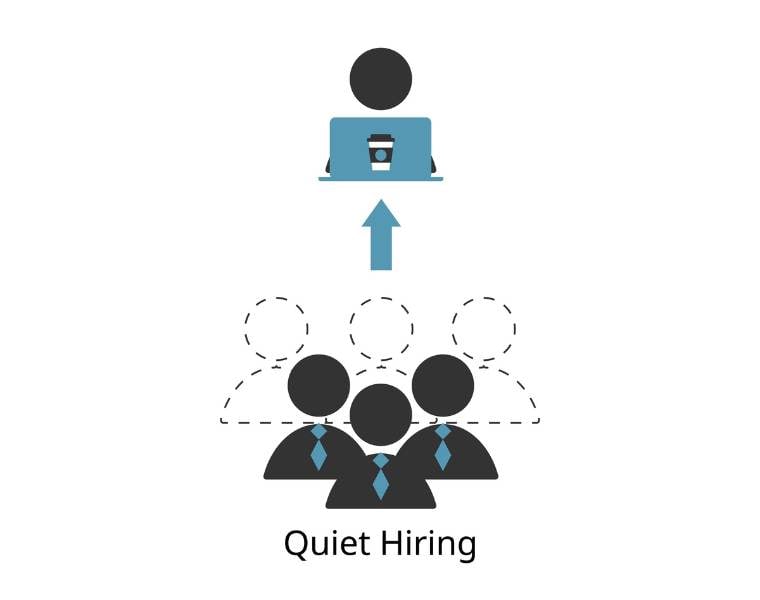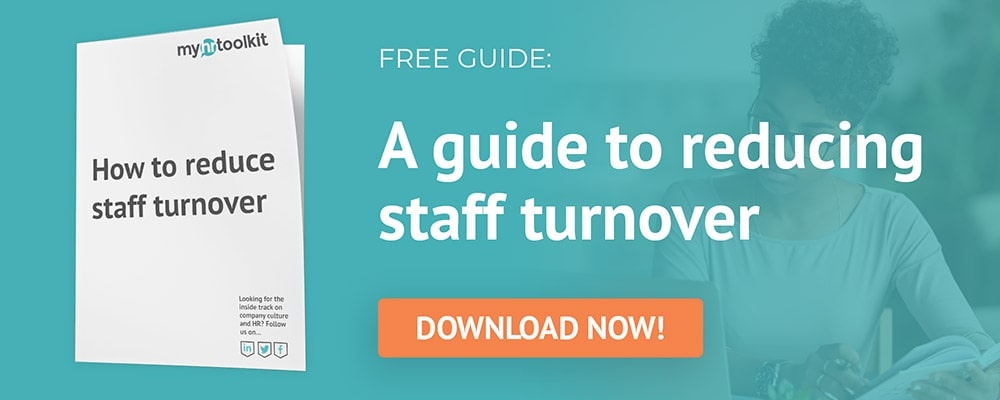During 2022, we saw the rise in prominence of several business buzzwords such as Quiet Quitting, Quiet Firing, and Fast Quitting. Well, the start of 2023 has seen a similar, new phrase come to the forefront; Quiet Hiring.
What is quiet hiring?
Quiet hiring is when an organisation acquires new skills without hiring any new full-time staff. There are actually two types of quiet hiring. The one we’re focussing on in this article is ‘internal’ quiet hiring. The other, however, is ‘external’ quiet hiring, which is when a company avoids hiring new employees by bringing on short-term contractors to do a particular job.
Internal quiet hiring is when an employer looks to their existing staff members upon realising that a new job role, requiring new skills, becomes necessary within the company. Rather than looking outwards and advertising a job, interviewing all the candidates, and then eventually hiring someone, employers are starting to first assess what they’ve already got. There may be staff members who are looking to progress into a slightly different role, or even people who would love the opportunity to change role altogether and learn some new skills.
Quiet Hiring - Benefits for the employer
Quiet hiring is a cost-effective option
Possibly the main benefit of quiet hiring is the fact that it saves the company a lot of money. Firstly, there are the costs involved with the recruitment process such as training expenses, as well as the fact that the employer (and perhaps team leaders too) will be away from the desk taking time conducting interviews. If the employer tends to use recruiters to help find candidates, quiet hiring rules out the cost of the recruiter too.
Furthermore, avoiding hiring a full-time member of staff means avoiding, of course, paying out another full salary, which is likely the biggest cost involved with bringing on a new person. On top of this, you will also avoid having to spend money on any benefits you offer your existing staff, such as bonusses.

It’s a quick and efficient way of hiring someone
If you find that a new set of skills is required urgently in your company, going through the recruitment process to find a new employee simply may take too long. By the time you’ve found someone, damage may have been done due to the lack of the required skills in the meantime. Plus, you may be forced into making a knee-jerk decision and end up hiring the wrong person, which brings even more issues.
But with internal quiet hiring, companies can respond and adapt quickly to any changes in circumstances and new skills that may be required by looking at current employees and identifying anyone who may be suitable to fulfil a new role, whether that be short-term or permanently.
Quiet hiring improves staff retention and productivity
If your employees are aware of the possibility of job development or the potential to move into a different role at some point, you may benefit from higher staff retention. Many employees don’t like the idea of their job role becoming stagnant, so this culture of possibility will appeal to them. This, in turn, can increase morale, engagement, and overall productivity amongst your workforce as they are likely working harder to put themselves in a better position for progression when an opportunity arises.
What to be aware of when quiet hiring
However, you must be careful to make sure you don’t quiet hire in a way that makes your employees feel unappreciated. You should avoid just delegating random roles to random workers; it’s important to spend some time thinking about who in particular would suit the new role, and pose the role to the workers so they can put themselves forward if they wish.
It’s also important that you ensure your employees thoroughly understand the new responsibilities being given to them, so it’s also worth spending some time inducting them properly into their new role. Furthermore, providing them with continual support and communication whilst they get used to their new role will also help to avoid confusion and productivity drops. After all, this time spent ensuring your quiet hiring is successful will amount to far less time than it’d take to hire a new employee altogether.
All in all, quiet hiring can certainly save you bags of time, money, and resources, cutting out the need for the long and tricky interview process. Looking internally at your existing pool of talent may help you find someone perfectly suited to any new role or skills your company requires, and therefore benefitting from higher employee engagement and productivity amidst an atmosphere of job prosperity.
Read more from the myhrtoolkit blog

Written by James Lawson
James is a marketing executive at myhrtoolkit, and he's responsible for engaging the company’s existing customer and partner base on digital channels and creating helpful resources targeted at HR professionals and business managers.


 Holiday Planner
Holiday Planner Absence Management
Absence Management Performance Management
Performance Management Staff Management
Staff Management Document Management
Document Management Reporting
Reporting Health and Safety Management
Health and Safety Management Task Management
Task Management Security Centre
Security Centre Self Service
Self Service Mobile
Mobile.jpg)




